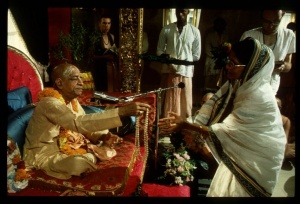CC Adi 17.126 (1975): Difference between revisions
(Vanibot #0027: CCMirror - Mirror CC's 1996 edition to form a basis for 1975) |
(Vanibot #0020: VersionCompareLinker - added a link to the Version Compare feature) |
||
| Line 2: | Line 2: | ||
<div style="float:left">'''[[Sri Caitanya-caritamrta (1975)|Śrī Caitanya-caritāmṛta (1975)]] - [[CC Adi (1975)|Ādi-līlā]] - [[CC Adi 17 (1975)|Chapter 17: The Pastimes of Lord Caitanya Mahāprabhu in His Youth]]'''</div> | <div style="float:left">'''[[Sri Caitanya-caritamrta (1975)|Śrī Caitanya-caritāmṛta (1975)]] - [[CC Adi (1975)|Ādi-līlā]] - [[CC Adi 17 (1975)|Chapter 17: The Pastimes of Lord Caitanya Mahāprabhu in His Youth]]'''</div> | ||
<div style="float:right">[[File:Go-previous.png|link=CC Adi 17.125 (1975)|Ādi-līlā 17.125]] '''[[CC Adi 17.125 (1975)|Ādi-līlā 17.125]] - [[CC Adi 17.127 (1975)|Ādi-līlā 17.127]]''' [[File:Go-next.png|link=CC Adi 17.127 (1975)|Ādi-līlā 17.127]]</div> | <div style="float:right">[[File:Go-previous.png|link=CC Adi 17.125 (1975)|Ādi-līlā 17.125]] '''[[CC Adi 17.125 (1975)|Ādi-līlā 17.125]] - [[CC Adi 17.127 (1975)|Ādi-līlā 17.127]]''' [[File:Go-next.png|link=CC Adi 17.127 (1975)|Ādi-līlā 17.127]]</div> | ||
{{CompareVersions|CC|Adi 17.126|CC 1975|CC 1996}} | |||
{{RandomImage}} | {{RandomImage}} | ||
==== TEXT 126 ==== | ==== TEXT 126 ==== | ||
| Line 11: | Line 10: | ||
<div class="verse"> | <div class="verse"> | ||
:eta-kāla keha nāhi kaila hinduyāni | :eta-kāla keha nāhi kaila hinduyāni | ||
:ebe ye udyama cālāo kāra bala | :ebe ye udyama cālāo kāra bala jāni' | ||
</div> | </div> | ||
| Line 18: | Line 17: | ||
<div class="synonyms"> | <div class="synonyms"> | ||
eta-kāla—so long; keha—anyone; nāhi—not; kaila—performed; hinduyāni—regulative principles of the Hindus; ebe—now; ye—that; udyama—endeavor; cālāo—you propagate; kāra—whose; bala—strength; | eta-kāla—so long; keha—anyone; nāhi—not; kaila—performed; hinduyāni—regulative principles of the Hindus; ebe—now; ye—that; udyama—endeavor; cālāo—you propagate; kāra—whose; bala—strength; jāni'-I want to know. | ||
</div> | </div> | ||
| Line 25: | Line 24: | ||
<div class="translation"> | <div class="translation"> | ||
"For so long you did not follow the regulative principles of the Hindu religion, but now you are following them with great enthusiasm. May I know by whose strength you are doing so? | |||
</div> | </div> | ||
Latest revision as of 16:00, 26 January 2020

A.C. Bhaktivedanta Swami Prabhupada
TEXT 126
- eta-kāla keha nāhi kaila hinduyāni
- ebe ye udyama cālāo kāra bala jāni'
SYNONYMS
eta-kāla—so long; keha—anyone; nāhi—not; kaila—performed; hinduyāni—regulative principles of the Hindus; ebe—now; ye—that; udyama—endeavor; cālāo—you propagate; kāra—whose; bala—strength; jāni'-I want to know.
TRANSLATION
"For so long you did not follow the regulative principles of the Hindu religion, but now you are following them with great enthusiasm. May I know by whose strength you are doing so?
PURPORT
It appears that from the aggression of Baktiyār Khiliji in Bengal until the time of Chand Kazi, Hindus, or the followers of the Vedic principles, were greatly suppressed. Like the Hindus in present-day Pakistan, practically no one could execute the Hindu religious principles freely. Chand Kazi referred to this condition of Hindu society. Formerly the Hindus had not been straightforward in executing their Hindu principles, but now they were freely chanting the Hare Kṛṣṇa mahā-mantra. Therefore it must have been by the strength of someone else that they were so daring.
Actually, that was the fact. Although the members of the so-called Hindu society had followed the social customs and formulas, they had practically forgotten to execute their religious principles strictly. But with the presence of Śrī Caitanya Mahāprabhu they actually began following the regulative principles according to His order. That order is still existing, and anywhere and everywhere, in all parts of the world, one can execute it. That order is to become a spiritual master under the direction of Śrī Caitanya Mahāprabhu by following the regulative principles, chanting daily at least sixteen rounds of the Hare Kṛṣṇa mahā-mantra, and preaching the cult of Kṛṣṇa consciousness all over the world. If we adhere to the order of Śrī Caitanya Mahāprabhu, we shall get spiritual strength without a doubt, and we shall be free to preach this cult of the Hare Kṛṣṇa movement and not be hampered by anyone.